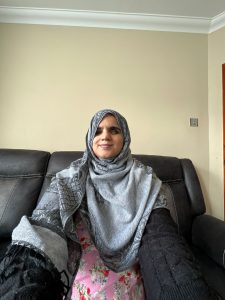“I want to show my child what is possible” – Khafsa Ghoulam

-
At BAME Vision, we are celebrating Blind and Partially Sighted mothers from ethnic minorities, with the aim of contributing to the diverse representation of the vision-impaired community. In this series, we are looking to shine a light on mothers who work and volunteer, as we find out more about this largely unreported part of society. We will discuss motherhood, culture, mental health, support systems, self-confidence, and everything else in between.
Our first guest is Khafsa, who is totally blind and a first-time mum of a two-year-old.
How would you describe yourself?
I am completely blind and from a Pakistani background. I have Peters Anomaly and although I’ve had the condition since birth, I wasn’t diagnosed until I and my family and moved to the UK when I was 3 years old, and this is when I was registered for Severely Sight Impaired (SSI).
I am quite level-headed and want the best for those that I work with, especially as a mum. Always thinking ahead, and putting my and my family’s welfare first. I do take things seriously, but I also know how to laugh. All in all I’m quite an outgoing person, but if push came to shove, my family and I would always come first. I used to work myself down until I get burnt out, but now that I’m a mum, I am quite strict with my time. After this point of the day, it’s mum’s time. I’m a mum!
So, culturally, do you feel that people expect something different from you as a vision-impaired mum?
I definitely do, people expect me to be dependent on others. A taxi driver asked me once what I do, and when I told him I’m going to work, I live with my husband and my family – his first reaction was “You’re married?! And you have a child?!” and I said “Yes.” He was so surprised, he didn’t expect me to have that. It’s kind of like people think people do things for you all the time and come from an Asian culture, but with my situation, I don’t really get help like that. People say “Well you do very well with your child don’t you!” And there’s no one else to care for my child really, is there?
Sometimes when people see me with a child, they feel sorry for me, instead of happy. They say that it must be really hard. Yes, I have a hard time, but so does every mum! My child is boisterous, he has tantrums, but that’s a kid for you. He’s just a child. And yes, he’s hard work, but he’s my child. I don’t regret having him! People make it seem like I have it harder, and it kind of frustrates me because yes it is hard, but it doesn’t take away my pride. They expect me to have an easier life.
Culturally, I think people don’t realise that being a vision-impaired mum doesn’t take responsibility from you. When I first had my child, I had family asking “How are you going to care for a baby, how are you going to manage” it does sadden me when your own family doesn’t have a positive expectation of you. In the beginning, I felt like I had to prove a point, but not anymore.
They also think that when he grows up he’s going to help me, and that’s not why I’m raising him. I’m raising him to be my son, not my helper. I want him to have a nice life, I want him to live his life.
What is your favourite blind mum hack?
It might sound silly, but marking the syringe for baby’s medication is a godsend! There are a lot of other basic ones, but this one has to be my favourite. You can use something to scratch it.
You’re a new mum, do you have a Mother’s Day tradition?
Not really, my mother’s day tradition is to be a mum! Maybe as my child gets older he might pick up some of the traditions.
What would you like to say to other blind mums from ethnic minorities out there, and what would your advice be?
Be yourself and do what is best for you and your child. it is worth remembering that your parents come from a different generation, it’s okay to do things your way as a mum. Don’t let others who are supporting you define what you should be doing.
We will talk about this in more detail in part two, so don’t give too much away!
So, briefly, what do you like most about being a working mum who is also vision impaired?
I like the fact that I get to provide for my child, and I get to do things for myself. Equally, I get to show my child what is possible, as he grows up he’s going o know that his mum works. He’s going to learn as he gets older that you have to work in order to earn, things don’t just happen. I also like working as it gives me time for myself, and contributes to my development. For me, a mum who works, it gives her space to be her own person. Not just be a mum but be me.
Be sure to tune in for part two, where Khafsa will be joining us to discuss more her work life, the challenges she has faced, and the services she has accessed to support her in employment.
Written by Sylvia Chengo – BAME Vision
